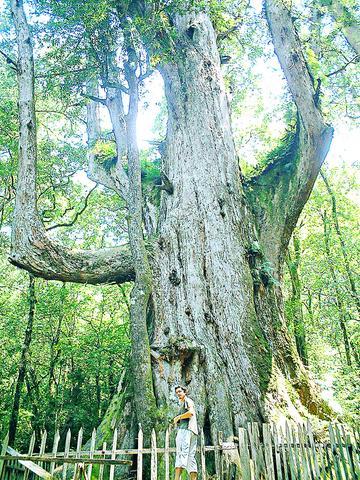Eco-tourism hasn't yet taken root in Taiwan, but for the Atayal tribe of Hsinchu County's Smangus (司馬庫斯) the roots were put down some 2,500 years ago -- a grove of Formosan cypress trees that spent its first two millennia in utter isolation has become something of an economic boon for the remote Aboriginal village since being discovered in 1991.
The grove stands silently beside a stream high in the mountains near Tapachienshan, the mountain sacred to the Atayal as their place of origin, which graces the back of NT$500 notes. The trees are not only among the oldest on the island, they're among the biggest. According to a 1996 report by Taiwan's Forestry Bureau, the grove is home to the nation's second and third largest trees, respectively 20.5m and 19.7m in girth.

PHOTO: DAVID MOMPHARD, TAIPEI TIMES
No wonder then that these giants are known in Chinese as divine trees (
Knotted history
The irony is that the Atayal of Smangus have long benefited economically from hardwood trees, albeit in a less ecologically-friendly fashion. The Japanese relocated many Atayal tribes from their ancestral home in Nantou County in part to disband them into smaller groups that would not pose a threat to the colonizing forces and in part to conscript their help in felling the acres of hardwood that once crowned Taiwan's mountaintops.
Although hardwood trees traded at a premium, the Atayal, like many other Aboriginal groups, refused to cut down the oldest of the trees, believing each possessed a spirit that would haunt them if the trees were felled.
Their refusal to do so -- and the fact that this particular grove of majestic giants had purportedly never before been seen -- means that many remain standing today.
That's not to say that Atayal reverence for the trees is beyond reproach. Long after the Japanese left Taiwan and conservationists began demanding curbs on logging, the Atayal of Smangus continued felling the highly prized trees to earn a living, although they never touched the ancient giants.
"We had no option," said Masay (
Masay tells a story of KMT officials in Hsinchu County demanding that the residents of Smangus stop harvesting hardwood. "They would come up here and become very angry at us, yelling at us to stop cutting down trees," he said. "This was before there was a road to Smangus, only a [15km] trail. So we said: `you build a road and we'll stop cutting down trees.'" In 1994 they got their road, and with it the start of a burgeoning tourism industry.
But, as Masay tells it, the government's ultimate willingness to carve out a road on a mountainside and build bridges where there was previously only trail was not so much to see an end to logging as to see the ancient trees themselves. "After we found the trees, it didn't take long for interest in them to grow and for people to want to come see them. The government knew that without a road that would never happen."
Searching for the past
According to the story that has now become legend among the residents of Smangus, the discovery of the ancient grove and the subsequent development of their local economy was hardly happenstance, but the product of a visit to another Atayal tribe and ancestral intervention.
As the story goes, in 1991 a Smangus village elder traveled to see friends in an Atayal community in Bali, Taipei County. There he saw that the local economy prospered modestly from growing peaches and from an influx of tourists, who traveled from all parts of Taiwan to see that area's grove of ancient trees.
That same night the elder's ancestors came to him in a dream, saying that Smangus had it's own ancient giants located near red waters en route to Yuanyang Lake (鴛鴦湖). He returned to Smangus and immediately dispatched a team of young men to search for the divine trees. Nearly three months later they were found beside the stream whose bed is lined with brightly colored red rocks.
But the discovery of the trees was only part of the windfall. The residents of Smangus began planting peaches just as the Atayal in Pali had done. The peaches from the Lalashan area near Smangus are today widely considered the best in Taiwan.
And so fortunes have changed both for the Atayal of Smangus and the ancient cypress rooted in their land. "We owe a debt to the trees," Masay said, intoning that his tribe now has a vested interest in seeing that the trees remain standing. "We used to kill them for profit, now our livelihood is linked with theirs."
It's quite a haul into the hinterlands, but seeing Smangus and its ancient forest is well worth the effort. For more information on how to get there, you can contact the tribe at 0928-804-983 or visit their Web site at www.smangus.org.

March 10 to March 16 Although it failed to become popular, March of the Black Cats (烏貓進行曲) was the first Taiwanese record to have “pop song” printed on the label. Released in March 1929 under Eagle Records, a subsidiary of the Japanese-owned Columbia Records, the Hoklo (commonly known as Taiwanese) lyrics followed the traditional seven characters per verse of Taiwanese opera, but the instrumentation was Western, performed by Eagle’s in-house orchestra. The singer was entertainer Chiu-chan (秋蟾). In fact, a cover of a Xiamen folk song by Chiu-chan released around the same time, Plum Widow Missing Her Husband (雪梅思君), enjoyed more

Last week Elbridge Colby, US President Donald Trump’s nominee for under secretary of defense for policy, a key advisory position, said in his Senate confirmation hearing that Taiwan defense spending should be 10 percent of GDP “at least something in that ballpark, really focused on their defense.” He added: “So we need to properly incentivize them.” Much commentary focused on the 10 percent figure, and rightly so. Colby is not wrong in one respect — Taiwan does need to spend more. But the steady escalation in the proportion of GDP from 3 percent to 5 percent to 10 percent that advocates

From insomniacs to party-goers, doting couples, tired paramedics and Johannesburg’s golden youth, The Pantry, a petrol station doubling as a gourmet deli, has become unmissable on the nightlife scene of South Africa’s biggest city. Open 24 hours a day, the establishment which opened three years ago is a haven for revelers looking for a midnight snack to sober up after the bars and nightclubs close at 2am or 5am. “Believe me, we see it all here,” sighs a cashier. Before the curtains open on Johannesburg’s infamous party scene, the evening gets off to a gentle start. On a Friday at around 6pm,

A series of dramatic news items dropped last month that shed light on Chinese Communist Party (CCP) attitudes towards three candidates for last year’s presidential election: Taiwan People’s Party (TPP) founder Ko Wen-je (柯文哲), Terry Gou (郭台銘), founder of Hon Hai Precision Industry Co (鴻海精密), also known as Foxconn Technology Group (富士康科技集團), and New Taipei City Mayor Hou You-yi (侯友宜) of the Chinese Nationalist Party (KMT). It also revealed deep blue support for Ko and Gou from inside the KMT, how they interacted with the CCP and alleged election interference involving NT$100 million (US$3.05 million) or more raised by the